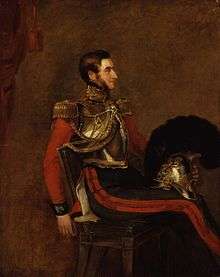Edward Pyndar Lygon
| Edward Pyndar Lygon | |
|---|---|
 Edward Pyndar Lygon in uniform of 2nd Life Guards | |
| Born | 3 April 1786 |
| Died | 11 November 1860 |
| Allegiance |
|
| Service/branch |
|
| Rank | General |
| Commands held | 2nd Life Guards |
| Battles/wars | Peninsular War |
| Other work | Member of Parliament |
General the Hon. Edward Pyndar Lygon, CB (3 April 1786 – 11 November 1860) was a senior officer in the British Army and a Member of Parliament.[1]
Background
Edward was the fourth son of William Lygon, 1st Earl Beauchamp, by his wife Catharine, the only daughter of James Denn. An elder brother was Henry Lygon, 4th Earl Beauchamp who also became an army general. Edward was educated at Westminster School and entered the British Army in 1803 as a cornet in the 2nd Life Guards.[2]
Military career
He was made lieutenant in 1805, captain in 1808 and major and fought in the Peninsular War from 1812 to 1814. He was made major and lieutenant-colonel in 1815 and commanded the 2nd Life Guards at the Battle of Waterloo.[3] He was awarded CB on 22 June 1815.
Further promotions as a staff officer were to lieutenant-colonel in 1818, colonel in 1822, major-general in 1837 [4] and lieutenant-general in 1846. He was appointed Inspector General of Cavalry.
He was given the colonelcy of the 13th Regiment of Light Dragoons in January 1845, a position he held until his death.[5] He was made a full general on 20 June 1854.
Parliamentary career
In 1818 Lygon was elected to Parliament for Callington, sitting until 1820. Although re-elected in March 1820 he was unseated on petition the following June.
Death and legacy
He died unmarried at his London home in 1860, although he also owned Spring Hill in Broadway, Worcestershire.
The Lygon Arms in Chipping Campden was named after him.[6]
Lygon Street, Carlton, Melbourne, Australia, was also named in his honour.
References
- ↑ "LYGON, Hon. Edward Pyndar (1786-1860), of 12 St. James's Square, Mdx.". History of Parliament Online. Retrieved 18 May 2017.
- ↑ "No. 15591". The London Gazette. 3 June 1803. p. 679.
- ↑ "British Cavalry Regiments and the Men Who Led Them 1793-1815: 2nd Regiment of Life Guards". napoleon-series.org. Retrieved 18 May 2017.
- ↑ "No. 20660". The London Gazette. 10 November 1846. p. 3987.
- ↑ "13th Hussars". regiments.org. Retrieved 18 May 2017.
- ↑ "Lygon Arms hotel". Retrieved 18 May 2017.
| Military offices | ||
|---|---|---|
| Preceded by Henry George Grey |
Colonel of the 13th Regiment of (Light) Dragoons 1845–1860 |
Succeeded by Allan Thomas Maclean |
| Parliament of the United Kingdom | ||
| Preceded by Hon. Charles Trefusis William Stephen Poyntz |
Member of Parliament for Callington 1818–1820 With: Sir Christopher Robinson |
Succeeded by Matthias Attwood William Thompson |